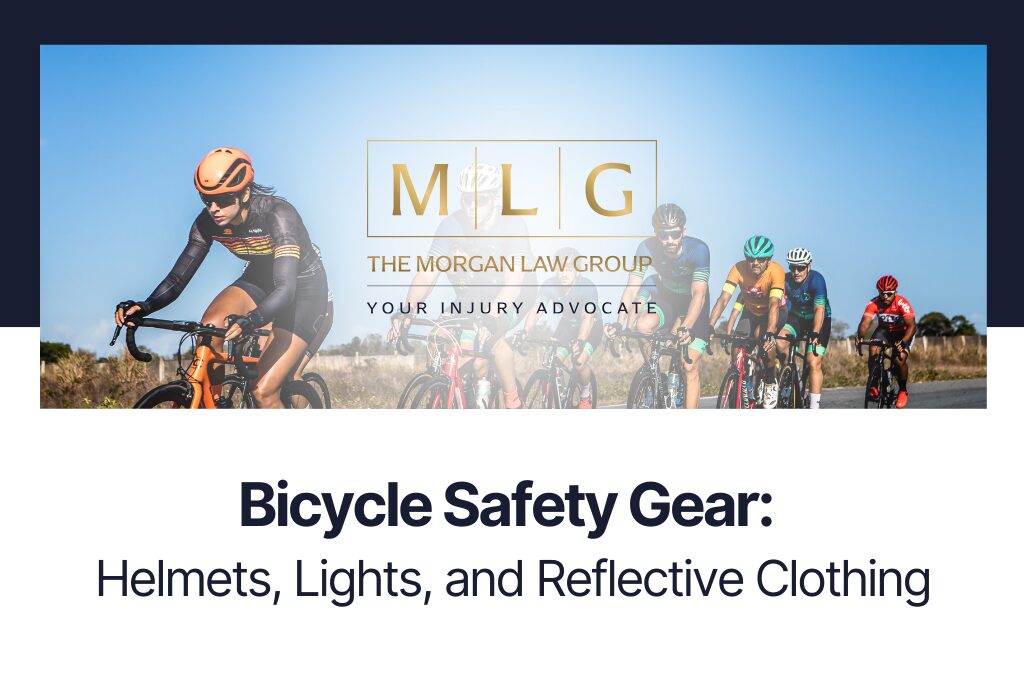To ensure the safety of those cycling in Florida becomes paramount. Understanding and utilizing proper safety gear when riding a bicycle isn’t just a good idea – it can either be a mitigating or aggravating factor in the outcome of a bicycle accident claim in Florida.
When sharing the road with vehicles poses inherent risks. Safety gear significantly reduces the severity of injuries in the unfortunate event of an accident. This includes:
- Helmets: These are your first line of defense against head injuries, which can be catastrophic.
- Lights and Reflectors: Essential for visibility, especially during dawn, dusk, or night riding.
- Reflective Clothing: Increases your visibility to motorists, particularly in low-light conditions.
Keep reading to explore and understand cycling essential safety gear, Florida’s specific regulations, and why having an experienced Florida bicycle accident attorney on your side is crucial.
Bicycle Helmet Laws in Florida
Florida’s approach to bicycle safety is meticulous, especially regarding helmet usage. The state’s regulations differentiate based on the age of the cyclist:
- Under 16: It is a legal requirement for any cyclist under the age of 16 to wear a bicycle helmet. These helmets must comply with safety standards set by recognized bodies such as the U.S. Consumer Product Safety Commission. This mandate underscores Florida’s commitment to protecting young riders, who may be more vulnerable on the roads.
- Over 16: For cyclists aged 16 and older, helmet usage is not compulsory by law. However, the recommendation to wear a helmet is emphatic, considering the proven benefits of helmet use. A well-fitted helmet can reduce the risk of severe head injuries, a statistic supported by extensive research including studies. This high level of effectiveness makes helmet usage critical, even for those not legally bound to wear them.
The emphasis on helmets in Florida law is not just about compliance but also about promoting a culture of safety among all cyclists. In addition to the immediate safety benefits, wearing a helmet can also have legal implications in the event of an accident. In scenarios where injuries occur, the use of a helmet – or the lack thereof – can influence legal outcomes in terms of liability and damages.
Bicycle Lights and Reflectors in Florida
Bicycle lights and reflectors in Florida are designed to maximize visibility and safety for cyclists during low-light conditions:
- Front Light: A front light that emits a white light visible from at least 500 feet must be installed on bicycles used between sunset and sunrise. This requirement helps ensure that motorists approaching from the front easily see cyclists, significantly reducing the likelihood of frontal collisions.
- Rear Light or Reflector: Similarly, a red reflector or a red light that is visible from at least 600 feet must be mounted on the back of the bicycle. This visibility is crucial for motorists approaching from behind, which is a common scenario in road accidents involving bicycles.
These specific requirements are rooted in a practical understanding of traffic dynamics and the importance of visibility. The visibility from 500 feet for front lights and 600 feet for rear lights or reflectors is designed to give motorists ample time to notice and react to the presence of a cyclist, thereby substantially lowering the risk of accidents.
Bicycle Safety Gears’ Factor in Bicycle Accident Claims
The legal principle of “comparative negligence” significantly influences the outcome of bicycle accident claims in Florida. This doctrine assesses the degree of fault among all parties involved in an accident, adjusting the compensation accordingly. This means that the actions of the cyclist, including their use of safety gear, are closely scrutinized when determining liability and compensation.
When a bicycle accident occurs, both the cyclist’s and the motorist’s behaviors are evaluated to determine how much each contributed to the incident. For instance, if a cyclist is involved in an accident and is found not to have been wearing a helmet or using proper lights and reflectors as required by Florida law, this can be seen as contributory negligence. Such negligence doesn’t bar recovery but does reduce the compensation that the cyclist can receive based on their percentage of fault.
To illustrate, consider a scenario where a cyclist is injured and claims $10,000 in damages from an accident. If the court finds that the cyclist was 20% at fault for not wearing a helmet, despite evidence that a helmet could have mitigated their injuries, the total compensation awarded would be adjusted accordingly. From the original $10,000, 20% (or $2,000) would be deducted, leaving the cyclist with an $8,000 compensation package.
Importance of Having a Bicycle Accident Attorney in Florida
Understanding and complying with safety gear requirements is more than a matter of personal safety; it is a significant factor in legal claims following accidents. Non-compliance can lead to a reduction in damage recovery, reflecting the law’s emphasis on personal responsibility and precaution.
If you’re involved in a bicycle accident, having a skilled bicycle accident attorney in Florida is invaluable. Your bike accident attorney can:
- Investigate the Accident: Gathering evidence, interviewing witnesses, and reconstructing the scene to determine liability.
- Negotiate with Insurance Companies: Insurance adjusters often try to minimize payouts. A bicycle accident attorney ensures you receive fair compensation.
- Litigate Your Case: If a fair settlement cannot be reached, your attorney can take your case to court.
If you or a loved one has been injured in a bicycle accident, don’t hesitate to contact us at The Morgan Law Group. We’re here to help you navigate the legal process and secure the compensation you deserve. We champion in representing victims of bicycle accidents in Florida.

